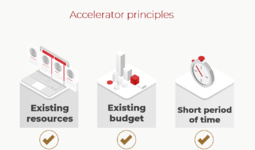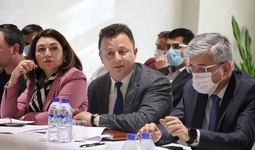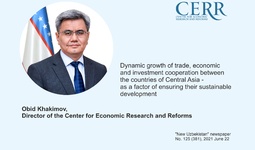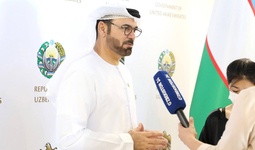Experts from the Center for Economic Research and Reforms Khasanjon Majidov and the Ministry for the Development of Information Technologies and Communications Ilkhom Khujakulov presented an overview of the world experience in implementing unified billing system for utilities, which is an effective solution to problematic issues in the process of introducing billing in Uzbekistan.
The full version of the article will be published in the 4th issue of the journal "Economic Review".
There is a rather complex system of payments for utility bills in Uzbekistan that requires payments to be made to various organizations separately. However, a number of measures were taken to create a unified billing system of utilities, several legal acts were adopted.
In particular, by the Resolution of the Cabinet of Ministers dated September 14, 2017 No. 726, a number of ministries and departments were assigned to develop and launch the Unified Billing System by August 1, 2018, as well as to connect information systems and databases of power supply and gas supply to it - by January 1, 2019, drinking water supply, sewerage and heat supply - by 1 January 2021.
According to the other Resolution of the Cabinet of Ministers dated January 04, 2019 No. 5, it was assumed to take several measures by April 1, 2019 to create a separate unified billing system of utilities in Tashkent.
However, a long-waited system in the country has not yet been created. That is why studying the process of creating a unified billing system of utilities and the eliminating specific problems that hinder this have become one of the most urgent areas of the Accelerator of Socio-Economic Reforms . Therefore, within the 100-day period of the Accelerator's work, one of the priority tasks was determined to solve problems in the field of creating a unified billing system.
Billing - is an activity that processes metering data for electricity and utilities, ensures mutual settlements of consumers with energy sales organizations, housing and communal services enterprises.
Representatives of relevant ministries and departments, the private sector, research centers and other organizations were involved in the process of solving this problem. Field studies, seminars based on the methodology developed in cooperation with Harvard University and the UAE Government Accelerators were carried out and relevant foreign experience was studied.
Implementation of Acceleration in Uzbekistan
World experience shows that in order to optimize the activities of housing and communal services and increase consumer satisfaction with the quality of services, it is necessary to move to the principle of “consumer - a single system of housing and communal services”. A unified billing system is the creation of a single system of payment processes in the republic.
In this regard, the creation of a single subscriber identifier and its inclusion in the existing billing systems of Regional Electric Networks , Regional gas supply, Water supply, Heating sypply and garbage disposal companies was defined as a task that needs to be solved within 100 days.
A working group formed by the Accelerator of more than 10 representatives of ministries and departments, which also included officials from the Dubai Electricity and Water Supply Authority, conducted research and identified a number of problems that need to be solved.
Currently, the relationship between consumers and communal services in the country is based on the principle of "consumer - a separate communal enterprise", and the following problems arise when integrating existing billing systems for housing and communal services:
- billing systems do not fully meet modern requirements;
- inconsistency of consumer data in the existing billing systems of housing and communal services, due to the lack of a single consumer identifier, which creates obstacles in the integration of existing databases (for example, Akhmedov Bekzod in the billing system of Regional Electric Networks is registered as Begzod Akhmedov in Regional gas supply);
- location of billing systems of utility providers at different technicalplatforms;
- duplication of consumers’ account from different regions in billing systems;
- the electronic data exchange between the existing databases of utilities and the systems of the relevant departments are not fully established;
- the lack of analysing and forecasting features.
The working group also identified the main tasks of a unified system:
- keeping a unified consumer database;
- providing an opportunity for consumers to control funds in their accounts in accordance with the current tariffs for utilities;
- analyzing the consumption patterns of utilities, systematic and transparent monitoring;
- expanding opportunities for the provision of interactive services in the field of utility services, including the use of electronic payment systems;
- unifying all participants in housing and communal services in the Republic of Uzbekistan into a single information space;
- comprehensively analyzing consumers' solvency by servicing the credit information system for the execution of taxes, fines and other types of payments.
To achieve the above tasks and functions within the framework and capability of the Accelerator, in the first 50 days of the project, the working group completed the initial technical work to establish the use of the personal identification number of an individual (PINO) and the cadastral number of the building as consumer identifiers and began to enter data into the databases. Over the next 50 days, the data entry was completed and the cadastral information was checked for relevance.
In general, the following work was done:
- data of more than 20 million consumers in the utility databases were processed;
- the data in the accounting systems of all utility services has been cleaned up. The number of subscribers to which PINO was linked as a single identifier has reached more than 5 million.
- the practice of providing users with cadastral information in accordance with the requirements of utility companies was introduced. It has been established that the linking of cadastral numbers to the subscriber accounts will be carried out on a regular basis, depending on the technical capabilities of utility services.
- the owners of the billing systems have been informed about the need for regular data cleansing, as well as updating databases and transferring customer data to a single identifier.
It is important to note that unifying user data to PINFO and cadastral number will help to make the transition to a unified billing system more comfortable for the population (without data loss, non-compliance of users, etc.).
Conclusion
The introduction of a unified billing system of utility bills will enable utility consumers to receive reliable information on the status of personal accounts, as well as receive this data by entering PINFO in payment and other systems (such as Payme, Apelsin, Click, etc.). This will eliminate the need to provide additional certificates to each utility company and reduce the time required to pay utility bills.
In addition, the establishment of PINFO as a single personal identifier in the provision of all state, banking, social and other services in accordance with the Presidential Decree of 23.03.2021 will enhance the relevance of actions in this direction.
Actual solution
March 23, 2021 the Decree of the President of the Republic of Uzbekistan "Additional measures to create satisfactory conditions for the population and business entities when using public services, reducing bureaucratic barriers" was issued, which stipulates that from July 1, taxpayers will be kept in tax authorities using a personal identification number of an individual (PINO). It has been established that PINFO is considered a single identifier that certifies the identity of a citizen in the provision of all government, banking, social and other services. It is forbidden to maintain separate numbers for the identification of individuals by state bodies and organizations.
Khasanjon Majidov, Leading Researcher, CERR
Ilkhom Khujakulov, Ministry for the Development of Information Technologies and Communications
Read the full version of the article in the 4th issue of the journal "Economic Review".





















leave a comment